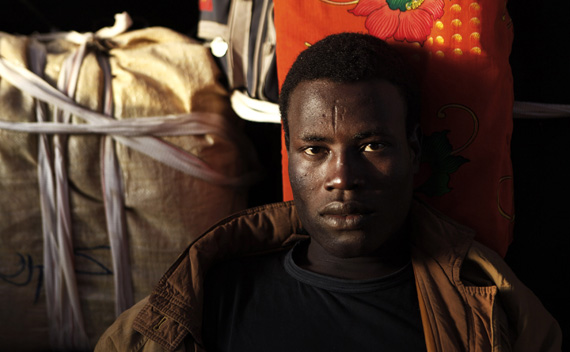Stopping Wartime Sexual Abuse—of Men
More on:

Today, the Internationalist would like to draw your attention to a disturbing phenomenon ignored by the foreign policy community but all too common in global conflict zones: The pervasive sexual abuse of men in war.
Women, of course, bear the main brunt of wartime sexual violence—as they always have. Last December, my CFR colleague Mark Lagon hosted a sobering meeting with the eminent legal scholar and activist Catharine MacKinnon. Now the special gender adviser to the prosecutor at the International Criminal Court, Mackinnon in 2000 argued the path-breaking legal case Kadic vs. Karadzic—about mass Serbian rape of Bosnian women—which for the first time established mass rape as an act of genocide.
Over the past two decades, international attention to rape as a weapon of war has been growing. Documentary filmmakers have often been in the forefront. In 2006 Lisa F. Jackson traveled to DRC to interview thousands of rape victims, and their perpetrators. Her resulting film, The Greatest Silence: Rape in the Congo, won the Special Jury Prize at Sundance in 2008 and subsequently inspired a UN resolution condemning rape as a weapon of war. Several of my CFR colleagues—including Laurie Garrett, Isobel Coleman, and Matthew Waxman—have spoken and written eloquently on the scope of such atrocities and the need to hold perpetrators accountable.
At the same time, as the Guardian reported on Sunday, the United Nations (UN) and international nongovernmental organizations (NGOs) “barely acknowledge” the pervasive sexual violence against men that occurs in modern war. The article documents the terrible suffering of a Congolese refugee who was captured by rebels and raped multiple times per day, and watched countless other men be similarly brutalized. 22% of men in Eastern Congo reported being victims of sexual violence, compared to 30% of women. One victim reported the crime to police, and was laughed at. A doctor in whom he confided merely gave him Panadol (a local equivalent of Tylenol). He described:
“Everybody has heard the women’s stories. But nobody has heard the men’s.”
The violence, and the disregard, is global. 80% of Bosnian males imprisoned in concentration camps and 76% of El Salvadoran male political prisoners report sexual abuse. Yet, of roughly 4,000 NGOs addressing wartime sexual violence, only 3% mentioned male victims (and usually only in passing).
International institutions are also falling short. They should be lauded for attempting to address mass violence against women during wartime, but the protection and outreach must be extended to all victims. The Guardian quoted one refugee who sought help from the Office of the United Nations High Commissioner for Refugees (UNHCR) and was told “‘we have a programme for vulnerable women, but not men.’” Margot Wallström, the UN special representative of the secretary-general for sexual violence in conflict counters that UNHCR does assist both men and women, but that women are “overwhelmingly” the victims. Emerging studies, however, suggest sexual violence against men is more widespread than commonly acknowledged.
Part of the difficulty stems from the fact that some countries do not criminalize sexual abuse of men, as this report (PDF) by the Office for the Coordination of Humanitarian Affairs documents. International humanitarian law criminalized rape in the twentieth century, but “prosecution was nonexistent” during the Nuremberg and Tokyo trials. The International Criminal Tribunal for the Former Yugoslavia (ICTY) and its Rwandan counterpart (ICTR) included rape in the category of crimes against humanity, war crime, and genocide, but abuse against women earned harsher punishment than abuse against men.
However, Lara Stemple of the University of California’s Health and Human Rights Law project also notes that:
“There are dozens of references to “violence against women” — defined to include sexual violence — in United Nations human rights resolutions, treaties and agreements, but most don’t mention sexual violence against men.”
She adds:
"The UN Security Council Resolution 1325 in 2000 treats wartime sexual violence as something that only impacts on women and girls… Secretary of State Hillary Clinton recently announced $44m to implement this resolution. Because of its entirely exclusive focus on female victims, it seems unlikely that any of these new funds will reach the thousands of men and boys who suffer from this kind of abuse. Ignoring male rape not only neglects men, it also harms women by reinforcing a viewpoint that equates ’female’ with ’victim’, thus hampering our ability to see women as strong and empowered. In the same way, silence about male victims reinforces unhealthy expectations about men and their supposed invulnerability."
The Internationalist recognizes that this is not an easy subject for men, in particular, to acknowledge. But we all need to shine the spotlight on such suffering to underscore that sexual abuse, no matter the gender of the victim, is abhorrent—and that perpetrators must be held to account. And the world needs to provide legal resources and psychological support to men who demonstrate the courage to come forward in reporting such crimes, despite the social stigma so often attached to their plight.
More on:
 Online Store
Online Store
